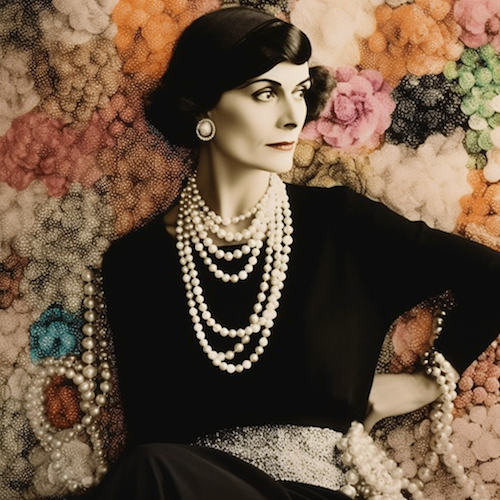¶ Coco Chanel: The designer who liberated women

¶ Introduction
Coco Chanel, born Gabrielle Bonheur Chanel on August 19, 1883, in Saumur, France, was a visionary fashion designer, businesswoman and founder of the Chanel long-lasting brand. She is renowned for her timeless designs, innovative use of materials, and for liberating women from the constraints of the corseted silhouette. Chanel lived an intense life and took all the opportunities she had to leave poverty behind and succeed.
¶ Early life
Her father, Albert Chanel, was a peddler and her mother, Jeanne Devolle, was a seamstress. Chanel's mother died when she was six years old, and her father abandoned her and her two sisters at an orphanage. They were raised by nuns at the Aubazine Abbey in Correze, France. There, Chanel was taught to sew, a skill that would prove pivotal in her life.
¶ Career
In 1910, Chanel moved to Paris and began working as a milliner. She quickly gained a reputation for her stylish hats. In 1913, she opened her first boutique, and in 1918 she opened the second one, this time in Biarritz. She became known for her simple yet sophisticated outfits composed of menswear elements which she encouraged women to adopt for their comfort and practicality.
The founder and namesake of the Chanel brand, she was credited in the post–World War I era with popularizing a sporty, casual chic as the feminine standard of style. This replaced the "corseted silhouette" that had earlier been dominant with a style that was simpler, far less time-consuming to put on and remove, more comfortable, and less expensive, all without sacrificing elegance.
"Fashion is not just about what you wear, it's about how you feel."
¶ Chanel No. 5
In 1921, Chanel launched her own perfume, Chanel No. 5. The perfume was created by Ernest Beaux, a perfumer who had been recommended to Chanel by Grand Duke Dmitri Pavlovich Romanov, a cousin of Tsar Nicholas II of Russia. Chanel No. 5 quickly became a best-selling perfume, and it remains one of the most popular perfumes in the world today.
"Luxury must be comfortable, otherwise it's not luxury."
¶ Two iconic designs
One of her most significant contributions to fashion was the "little black dress," which she introduced in 1926 and became a staple in almost every woman's wardrobe.
In the 1950s, Chanel introduced the Chanel suit, a tailored suit made of tweed. This piece quickly became a popular choice for working women and still today is a symbol of elegance and sophistication.
¶ Relationships
Chanel had several influential men in her life. Two of her first loves were Étienne Balsan, a wealthy textile heir who established Chanel as a milliner, and Arthur Edward 'Boy' Capel, an English aristocrat who installed her in Paris and financed her first shops. Her success allowed her to repay Capel's investment, and by 1919, she bought the entire building at 31 rue Cambon in Paris, which remains the headquarters of Chanel.
She had a brief but intense affair with Grand Duke Dmitri Pavlovich, a cousin of Tsar Nicholas II of Russia. Pavlovich introduced Chanel to Ernest Beaux, the perfumer who created Chanel No. 5.
¶ A Nazi spy?
Chanel's most controversial relationship though was with Hans Günther von Dincklage, a German officer during World War II. They met in 1933, and their relationship began in 1940, after the German occupation of France. Von Dincklage was a high-ranking officer in the German intelligence service, and he was responsible for overseeing the activities of the Gestapo in France. Chanel's relationship with von Dincklage made her the target of much criticism, as she was seen as collaborating with the enemy. After the war, she was forced to flee France and live in exile for several years.
¶ Or member of the French Resistance?
Newly unearthed documents presented at a 2023 retrospective shed light on Chanel's involvement with the French Resistance. These documents, which stand in stark contrast to the long-held belief that Chanel collaborated with the Nazis, reveal her role as a member of the ERIC network, a branch of the Forces Françaises Combattantes (FFC). In 2023, Chanel biographer Justine Picardie uncovered a membership card belonging to Chanel in the French national archives, further solidifying her connection to the Resistance.
Chanel never married, and was a complex enigmatic figure. Her relationships were often as unconventional as her fashion designs.
"A woman can be overdressed but never underdressed."
¶ Impact
Chanel's impact on high fashion was significant and lasting. Her designs stressed simplicity and comfort, liberating women from the elaborate, often uncomfortable styles that prevailed in the 19th century. She championed trousers for women, revolutionized the fashion industry with her collarless jacket and well-fitted skirt, and popularized the use of jersey fabric for women's clothing.
¶ Legacy
Chanel passed away on January 10, 1971, at the age of 87 in her apartment at the Hotel Ritz in Paris. Her legacy endures in the fashion world, with the Chanel brand remaining a symbol of elegance and timeless style while being one of the most successful luxury brands in the world. In 2022, the brand's revenue reached 15.3 billion U.S. dollars. Chanel has a strong brand presence in all major markets around the world, and its products are highly sought-after by consumers.
¶ Awards and honors
- In 1955, Chanel was awarded the Legion of Honour by the French government.
- In 1963, she was named to the Fashion Hall of Fame.
- In 1983, she was posthumously awarded the Coty Fashion Award.
¶ Sources
- Coco Chanel: The Life and Times of the Little Black Dress by Lisa Chaney
- Chanel: A Biography by Paul Morand
- Coco Chanel: Her Life, Her Work by Meryle Secrest
- Coco Chanel: The Legend and the Life, by Justine Picardie
- en.wikipedia.org/wiki/Coco_Chanel